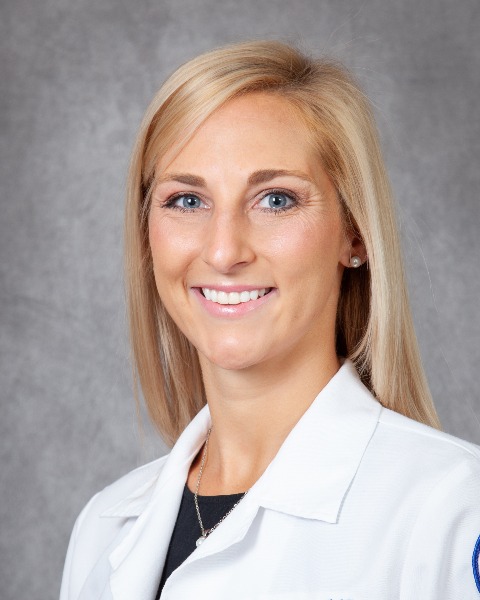Neonatal General
Category: Abstract Submission
Neonatology General 3
377 - Music Therapy for Retinopathy of Prematurity Exam Recovery
Friday, April 22, 2022
6:15 PM - 8:45 PM US MT
Poster Number: 377
Publication Number: 377.133
Publication Number: 377.133
Jennifer N. Hutchison, Driscoll Children's Hospital, Corpus Christi, TX, United States; Kim Beatty, Driscoll Children’s Hospital, Corpus Christi, TX, United States; Marshall Anderson, Driscoll Children's Hospital, Corpus Christi, TX, United States; Euming Chong, Driscoll Children's Hospital, Corpus Christi, TX, United States; Victor H. Gonzalez, University of Texas Rio Grande Valley School of Medicine, Mcallen, TX, United States

Jenni N. Hutchison, MD
Pediatric Resident PGY III
Driscoll Children's Hospital
Corpus Christi, Texas, United States
Presenting Author(s)
Background: Children born prematurely spend prolonged periods of time in the Neonatal Intensive Care Unit with exposure to multiple painful procedures. Studies have shown repeated exposure to pain during this period of development can lead to detrimental effects on behavioral and neurologic outcomes. Among these are Retinopathy of Prematurity (ROP) exams; while a painful procedure, the necessity cannot be overlooked. ROP is the leading cause of childhood blindness. These exams aim to help mitigate this development. Music therapy has proven effective in reduction of pain and physiologic instability in brief, painful procedures; however, the utility of music therapy during ROP exams in reducing pain, simulating analgesia or promoting quicker physiologic recovery has not been established.
Objective: Introduce and establish the utility of music therapy, in a music therapy naïve institution, by monitoring the effects on procedural and post-procedural physiologic stability and pain response in infants undergoing ROP exams.
Design/Methods: In this pilot prospective randomized, two-treatment crossover control trial, eligible neonates were randomized via permuted pairs upon enrollment. Neonates undergoing ROP exams of at least 28 weeks corrected gestational age, that were not intubated, sedated or mechanically ventilated were randomized to receive either standard care (anesthetic eye drops, sucrose and swaddling), or recorded Brahms lullaby via a portable music player, using a decibel meter to closely monitor volumes, in addition to standard care (experimental arm) during the initial ROP exam. For the sequential ROP exam, each neonate was crossed over to the alternate arm. Neonatal Pain, Agitation and Sedation Scale (NPASS) scores, heart rate, respiratory rate and oxygen saturation levels were collected at defined intervals throughout the exam.
Results: While receiving music, neonates had significantly lower total NPASS scores (p= < 0.001) 1/2 way through and 2 minutes following completion of exam (p= 0.009), compared to standard care alone. Linear regression demonstrated statistically significant changes in heart rate (p= < 0.001) ½ way through, and respiratory rate (p= < 0.001) two minutes following completion of exam; these physiologic decreases were also appreciated in one enrolled neonate with a failed hearing screen.Conclusion(s): Music played during ROP exams may have added effect in the quality of neonates development and definitive effects on pain. This pilot study demonstrates feasibility in implementation of music during these exams, with the added benefit of pain control and improvement in physiologic stability.
Jennifer Hutchison CVMedical CV.pdf
Table 2. Paired T-test of Total NPASS score. Means of total NPASS scores at each time point compared between music versus no music
Means of total NPASS scores at each time point compared between music versus no music
Objective: Introduce and establish the utility of music therapy, in a music therapy naïve institution, by monitoring the effects on procedural and post-procedural physiologic stability and pain response in infants undergoing ROP exams.
Design/Methods: In this pilot prospective randomized, two-treatment crossover control trial, eligible neonates were randomized via permuted pairs upon enrollment. Neonates undergoing ROP exams of at least 28 weeks corrected gestational age, that were not intubated, sedated or mechanically ventilated were randomized to receive either standard care (anesthetic eye drops, sucrose and swaddling), or recorded Brahms lullaby via a portable music player, using a decibel meter to closely monitor volumes, in addition to standard care (experimental arm) during the initial ROP exam. For the sequential ROP exam, each neonate was crossed over to the alternate arm. Neonatal Pain, Agitation and Sedation Scale (NPASS) scores, heart rate, respiratory rate and oxygen saturation levels were collected at defined intervals throughout the exam.
Results: While receiving music, neonates had significantly lower total NPASS scores (p= < 0.001) 1/2 way through and 2 minutes following completion of exam (p= 0.009), compared to standard care alone. Linear regression demonstrated statistically significant changes in heart rate (p= < 0.001) ½ way through, and respiratory rate (p= < 0.001) two minutes following completion of exam; these physiologic decreases were also appreciated in one enrolled neonate with a failed hearing screen.Conclusion(s): Music played during ROP exams may have added effect in the quality of neonates development and definitive effects on pain. This pilot study demonstrates feasibility in implementation of music during these exams, with the added benefit of pain control and improvement in physiologic stability.
Jennifer Hutchison CVMedical CV.pdf
Table 2. Paired T-test of Total NPASS score.
 Means of total NPASS scores at each time point compared between music versus no music
Means of total NPASS scores at each time point compared between music versus no music